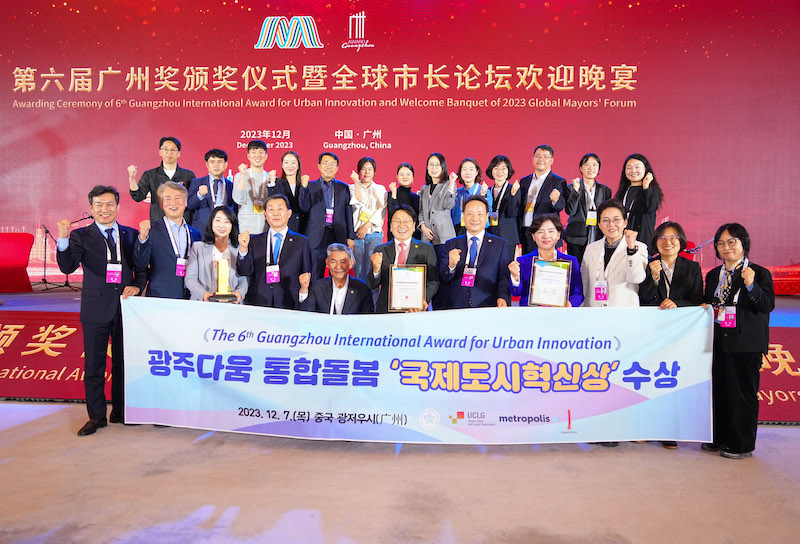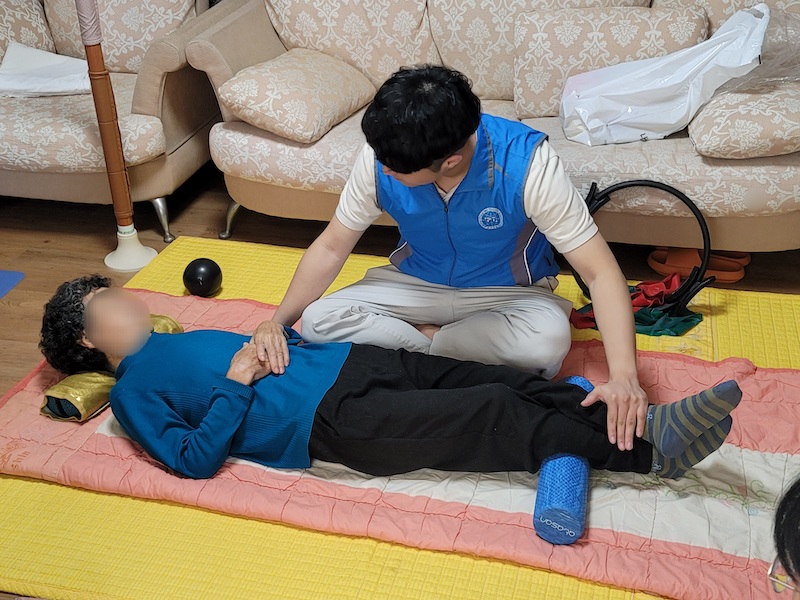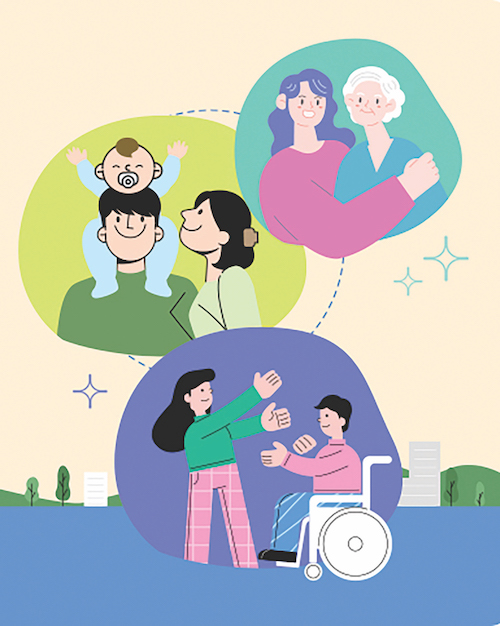Gwangju Cares: The Community Care Service Is a Winner!
By Jessica Lee
I am a Korean-Canadian living in Gwangju, which boasts of the beauty of Mt. Mudeung. Here in Gwangju, I am making grateful memories with my family and cherishing every moment. One day, I had a tremendous experience that I want to share.
The story begins with me receiving a phone call on October 13 and meeting Kim Kyeong Myeong, the action officer of the Care Policy Division of Gwangju City Hall. Once we met, she passionately explained about the project that she was working on, and it made me instantly think, “This person is sincere about this project!” The project was Gwangju Community Care Service, which was to compete for the world-renowned 6th Guangzhou International Award for Urban Innovation. Kim asked me to make a presentation in English for the final competition. I hardly knew then that this would lead me to an incredibly amazing experience both personally and professionally.
The Guangzhou Award is given every two years by the UCLG (United Cities and Local Governments), the WCLC (World Council of Large Cities), and Guangzhou City of China to discover and share environmental, economic, urban, and community innovation cases for the joint development of cities around the world.
In the competition, which included the Gwangju Community Care Service project, 274 projects from 54 countries and 193 cities were in the preliminaries, and Gwangju City was already honorably selected as one of the top 15 cities. But it didn’t end there. Gwangju elected to compete further via two English presentations that would be given in the final phase of the competition. It was a truly amazing project, with only five cities competing for awards in a comprehensive final selection process.
That is how I became a part of this project as an English presenter, but in fact, the most important reason why I wanted to be a part of this project was that this Gwangju Community Care Service program touched my heart. As I got to know more about this program, I couldn’t help but think that this is something what we really, really need. I believe that human dignity should be respected from the day of birth, throughout life, and until the day of death.
Education, experience, social status, wealth, etc. are all important factors to some people, but the most basic concept is human dignity, and when we meet alienated citizens living today, we often forget what basic human dignity is about. It is not that there were not already any care services or care policies for those in need, but they have not been helpful for those who did not meet the criteria or were alienated and isolated. Services were not for everyone who needed help, but only for those who were selected through an application and screening process.
However, the newly enhanced Gwangju Community Care Service has come as a new care service that provides care to citizens who need help regardless of the reason. There is a Care Call (1660-2642) that anyone can call for help for citizens in need of care, and a care manger for a required visit will be designated to identify whether the person requires immediate help or whether they may plan the type of service needed according to the situation and provide the necessary help as follow-up.
I think this is a program that plays a key role in many ways in preventing suicide and lonely deaths in a society where the aging population and the number of single-person households is increasing. It also connects estranged relationships between family members through community care, that is, relational care, and reminds us of the importance of family once again.
Above all, I would like to express my tremendous respect to the people who showed unremitting efforts and dedication in overcoming the many difficulties faced in the process – from initial planning to implementation and development – of this project becoming a sustainable inclusive community care: Gwangju Metropolitan City Mayor Kang Gi-Jung, the heads of Gwangju’s five districts (Dong-gu, Seo-gu, Nam-gu, Buk-gu, and Gwangsan-gu), and each smaller administrative area (dong), the members of City Council, private institutions, civic groups, scholars, and all participating citizens. I felt more sincere than anyone else in making my presentation because of the enthusiasm I had for the project that all these people had achieved together, and I had no regrets.
Finally, on December 7, 2023, I headed to Guangzhou, where the International Award for Urban Innovation ceremony was to be held, with the team from Gwangju City. The Yuexiu Convention Center in Guangzhou, the venue for the awards ceremony, displayed its grandeur and greatness, and the majesty of the event could be felt as speakers and mayors of more than 100 cities who were to participate in the award ceremony were present.
The awards ceremony finally began. People were on the stage, looking around at all the competitors and participants. And then the moment came when the final award winner was announced: Gwangju Metropolitan City! Tears of joy had already been forming in my eyes because it was such an important moment, and I wanted to focus with all my heart. But when the mayor received the wonderful shining trophy and gave his acceptance speech, I was overwhelmed with emotion, wondering if I had ever in my life felt so proud and thrilled as a resident of Gwangju. It was so touching to see all of us as a single Gwangju team, regardless of our affiliations and positions, encouraging each other, praising each other, recognizing each other’s efforts, and believing in each other.
Lastly, I began to wonder what goals Gwangju will set in the future, based on the experience of winning the top prize in the prestigious International Award for Urban Innovation competition. Like me, everyone who participated in this project must have felt immense pride as citizens of Gwangju, and this was definitely motivation that will help us all to grow further in our respective positions. I would like to share this honor with a grateful heart to all those who work hard and do their best to help citizens who need a helping hand through the Gwangju Community Care Service.

The Author
Jessica Lee is a Korean-Canadian who is now living in Gwangju. She has recently been part of the Gwangju Community Care Service project team that participated in the Guangzhou International Award for Urban Innovation competition, where the Gwangju entry won the top prize.
–
Gwangju Community Care Service
“No citizen is left out” is not just a slogan for the city of Gwangju. The previous caregiving system in Korea selected beneficiaries based on age and income, and only supported those who were eligible to make an application. To address this gap, Gwangju has created an innovative care model, Community Care, for anyone who needs care.

Dong-office (smallest administrative unit) care managers visit individuals in their homes, check their situation, and apply for needed services. Gwangju has launched 16 new care services and plans to inject US$7.74 million annually to encourage citizens facing economic hardship to take advantage of these care services. “Care Call” has been launched as a single application channel to increase convenience.
To ensure implementation, Gwangju has established a “dedicated division,” designated 320 care managers, and selected 38 private sector care service providers.
Source: Secretariat of Guangzhou International Award for Urban Innovation.





